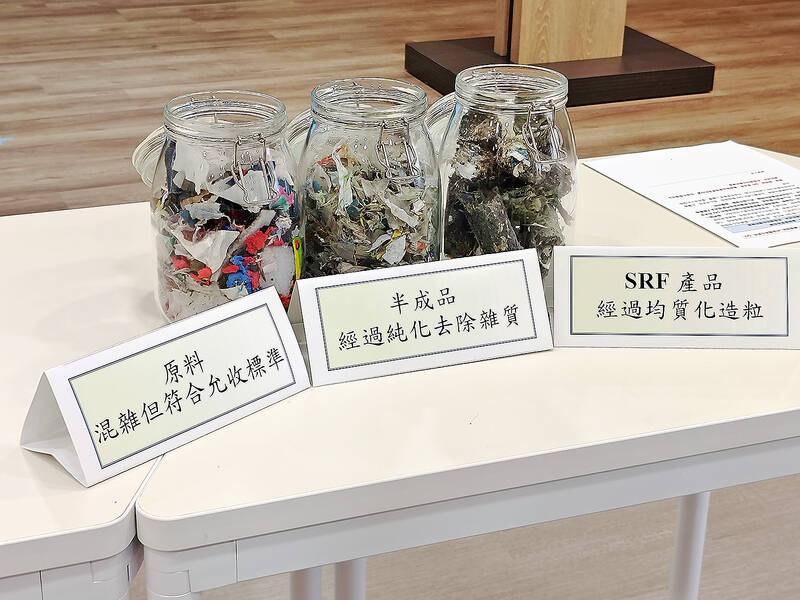The Ministry of Environment plans to propose stricter regulations on heavy metals and dioxins related to solid recovered fuel (SRF) by the end of the year, it said on Friday after releasing a report on the results of its nationwide inspection of 48 manufacturers and 18 users of SRFs.
SRFs are made from nonhazardous waste from businesses that can be burned as fuel, Minister of Environment Peng Chi-ming (彭啟明) said, adding that quality SRFs can only be produced through purification and homogenization.
The ministry would propose new SRF regulations by the end of the year to establish a third-party certification system, install closed-circuit television systems to monitor the areas where materials are collected and impose stricter standards on the emission of harmful substances such as dioxins, Resource Circulation Administration Director-General Lai Ying-ying (賴瑩瑩) said.

Photo: Wu Po-hsuan, Taipei Times
Under the stricter regulations, companies in the industry would have to make more effort and invest more to improve their products and processes, Peng said, adding that “this is not to increase the companies’ costs, but to increase Taiwan’s assets.”
SRF production volume has increased from 50,000 tonnes in 2019 to 290,000 tonnes last year, and most manufacturers were small and medium-sized businesses, Lai said, citing the report.
Although one manufacturer did not install an essential device for purification and homogenization of SRF, all manufacturers’ SRF products met quality standards, she said, adding that SRF combustion efficiency could be improved.
Eighteen manufacturers did not report where their products were sold, although it was required by law, and one manufacturer has never reported the destinations of its products, she said.
While 29 manufacturers sold SRF products directly to users in accordance with regulations, 11 did not and eight had yet to sell their products, she added.
Most SRF users were factories of large companies in the paper, cement and power supply industries, which mainly used coal, Lai said.
Although SRF-users’ sulfur oxides and nitrogen oxide emissions met regulations, 25 percent of the users fell short of the emission standards for dioxins, she said.
Overall, 52 to 70 percent of SRF manufacturers met standards and 30 to 48 percent needed improvements, while more than 90 percent of SRF users met standards and 6 percent should improve, she said.
Meanwhile, 14 SRF producers said they would leave the market after the inspection, while two manufacturers said they would stop production as SRF was not their main product, Lai said.
Two users said they would use other fuels instead of SRFs, she said.
Ten manufacturers said they would transition from the market as their waste had simple properties and as they had matured their waste reuse technology, she said.
About 6.5 million tonnes of waste is sent to incinerators every year, 1.8 million tonnes of which is business waste, Deputy Minister of Environment Shen Chih-hsiu (沈志修) said.
If business waste could be recycled using SRF production technology, incinerator capacity could be freed for burning noncommercial waste, which would reduce “waste mountains” in Taiwan, he said.

Taiwan has received more than US$70 million in royalties as of the end of last year from developing the F-16V jet as countries worldwide purchase or upgrade to this popular model, government and military officials said on Saturday. Taiwan funded the development of the F-16V jet and ended up the sole investor as other countries withdrew from the program. Now the F-16V is increasingly popular and countries must pay Taiwan a percentage in royalties when they purchase new F-16V aircraft or upgrade older F-16 models. The next five years are expected to be the peak for these royalties, with Taiwan potentially earning

STAY IN YOUR LANE: As the US and Israel attack Iran, the ministry has warned China not to overstep by including Taiwanese citizens in its evacuation orders The Ministry of Foreign Affairs (MOFA) yesterday rebuked a statement by China’s embassy in Israel that it would evacuate Taiwanese holders of Chinese travel documents from Israel amid the latter’s escalating conflict with Iran. Tensions have risen across the Middle East in the wake of US and Israeli airstrikes on Iran beginning Saturday. China subsequently issued an evacuation notice for its citizens. In a news release, the Chinese embassy in Israel said holders of “Taiwan compatriot permits (台胞證)” issued to Taiwanese nationals by Chinese authorities for travel to China — could register for evacuation to Egypt. In Taipei, the ministry yesterday said Taiwan

‘LIKE-MINDED PARTNER’: Tako van Popta said it would be inappropriate to delay signing the deal with Taiwan because of China, adding he would promote the issue Canadian senators have stressed Taiwan’s importance for international trade and expressed enthusiasm for ensuring the Taiwan-Canada trade cooperation framework agreement is implemented this year. Representative to Canada Harry Tseng (曾厚仁) in an interview with the Central News Agency (CNA) said he was increasingly uneasy about Ottawa’s delays in signing the agreement, especially as Ottawa has warmed toward Beijing. There are “no negotiations left. Not only [is it] initialed, we have three versions of the text ready: English, French and Mandarin,” Tseng said. “That tells you how close we are to the final signature.” Tseng said that he hoped Canadian Prime Minister Mark Carney

POSITIVE DEVELOPMENT: Japan and the US are expected to hold in-depth discussions on Taiwan-related issues during the meeting next month, Japanese sources said The holding of a Japan-US leaders’ meeting ahead of US President Donald Trump’s visit to China is positive news for Taiwan, former Japan-Taiwan Exchange Association representative Hiroyasu Izumi said yesterday. After the Liberal Democratic Party’s landslide victory in Japan’s House of Representatives election, Japanese Prime Minister Sanae Takaichi is scheduled to visit the US next month, where she is to meet with Trump ahead of the US president’s planned visit to China from March 31 to April 2 for a meeting with Chinese President Xi Jinping (習近平). Japan and the US are expected to hold in-depth discussions on Taiwan-related issues during the